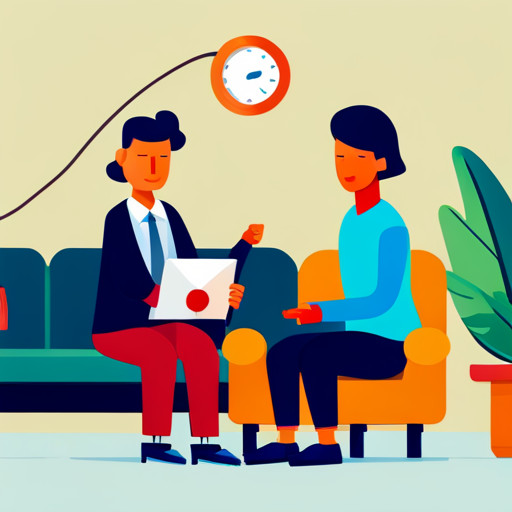Are you feeling like a fish out of water when it comes to navigating relationships while dealing with mental health challenges? You’re not alone. Mental health can greatly impact the dynamics of any relationship, whether it’s romantic, familial, or platonic. It can create misunderstandings, miscommunications and mistrust that can lead to an unhealthy and unhappy relationship.
Mental health affects how we perceive ourselves and others, how we communicate our needs and desires, and how we respond to stressors in the relationship. When left unaddressed or untreated, mental health issues such as depression, anxiety or bipolar disorder can create a ripple effect on all aspects of our lives including our relationships. In this article, we will explore the ways in which mental health impacts relationships and provide tips on how to navigate these challenges for a happier and healthier connection with your loved ones.
Key Takeaways
– Mental health challenges can affect communication, perception, and response to stressors in relationships.
– Open communication, setting boundaries, and prioritizing self-care and emotional safety are crucial for maintaining healthy relationships.
– Seeking support from therapy or support groups can provide additional tools and coping strategies for managing mental health issues within relationships.
– Mental health issues can lead to misunderstandings, emotional distance, conflicts, and stress in relationships, impacting intimacy and trust, but can be managed with proper treatment and support.
Understanding the Impact of Mental Health on Relationships

You might be wondering how your mental health can affect your relationships with the people around you. Well, it’s important to understand that mental health challenges can have a significant impact on the way you interact with others. For instance, if you struggle with anxiety, it may cause you to withdraw from social situations or avoid certain activities altogether. This could strain your relationships and make it difficult for loved ones to understand why you’re behaving in certain ways.
Similarly, depression can also have a profound effect on your ability to connect with others. It might make it challenging for you to express yourself in a meaningful way or leave you feeling emotionally drained all the time. This could lead to misunderstandings or conflicts in relationships because those around you may not realize what’s going on beneath the surface.
Ultimately, understanding how mental health affects relationships is crucial for maintaining healthy connections with others. By being aware of these impacts, you can take steps to address any issues that arise and work towards building stronger bonds with those around you. In the next section, we’ll explore some tips for navigating these challenges so that your relationships remain positive and supportive even during tough times.
Tips for Navigating Mental Health Challenges in Relationships

Navigating mental health challenges in relationships can be made easier by following these tips. The first tip is to communicate openly and honestly with your partner about your mental health struggles. This means being transparent about your emotions, triggers, and coping mechanisms. It also means actively listening and validating your partner’s experiences when they share their own struggles.
The second tip is to establish boundaries that prioritize self-care and emotional safety. This may mean taking breaks from certain situations or conversations that trigger anxiety or depression. It may also mean setting limits on how much emotional labor you can give without feeling depleted. By prioritizing self-care, you are not only caring for yourself but also creating a healthier dynamic within the relationship.
The third tip is to seek support from outside resources such as therapy or support groups. These resources provide additional tools and coping strategies for managing mental health challenges in a relationship. Additionally, seeking professional help demonstrates a commitment to personal growth and healing which can positively impact the relationship as a whole.
By implementing these tips, you can create a more supportive and understanding environment within your relationship while navigating the challenges of mental health struggles together. Seeking professional help can further enhance this journey towards healing and growth in both individual and relational contexts.
Seeking Professional Help

If you’re struggling with mental health challenges in your relationship, seeking professional help can be a game-changer. Therapy and counseling can provide you and your partner with tools to communicate effectively, manage stress, and build a stronger foundation. Medication and treatment options may also be beneficial for some individuals, so don’t hesitate to discuss these options with a mental health professional.
Therapy and Counseling
When seeking therapy or counseling, it can be helpful to approach the process with an open mind and a willingness to work on yourself. It’s important to remember that therapy is not a quick fix, but rather a journey towards self-discovery and growth. Here are some things to keep in mind as you begin your therapeutic journey:
– Therapy can be challenging and uncomfortable at times, but it’s important to trust the process and stick with it.
– Your therapist is there to support you, but ultimately the work of healing and growth is up to you.
– It’s okay if progress feels slow or if setbacks occur – this is all part of the process.
– Be honest with your therapist about your thoughts, feelings, and experiences – they are there to help guide you through them.
– Remember that therapy is a safe space where you can explore difficult emotions without fear of judgment.
As you continue on your journey towards better mental health, it’s important to consider all available options for treatment. One such option is medication.
Medication and Treatment Options
Taking medication for mental health is like putting on a pair of glasses – it can help bring clarity and focus to your thoughts and emotions. Just like how glasses help you see clearly, medication can alleviate symptoms such as anxiety, depression, and mood swings that may hinder healthy relationships. However, it’s important to note that medication alone is not a cure-all solution. It should be used in conjunction with therapy or counseling to address the root causes of mental health issues.
There are several different types of medication available for mental health treatment. Here’s an overview of some commonly prescribed medications:
| Type | Examples | How they work |
|---|---|---|
| Antidepressants | Prozac, Zoloft | Regulates serotonin levels |
| Anti-anxiety | Xanax, Valium | Calms the nervous system |
| Mood stabilizers | Lithium, Lamictal | Balances mood swings |
It’s essential to consult with a healthcare professional before starting any medication regimen since everyone’s body chemistry is unique and may react differently to certain medications. Remember that taking care of your mental health not only benefits yourself but also positively impacts your relationships with others. Next up: Building strong and healthy relationships by improving communication skills.
Building Strong and Healthy Relationships

To build strong and healthy relationships, you need to prioritize open communication and actively listen to your partner’s needs and concerns. This means creating a safe space for both of you to express yourselves without fear of judgment or criticism. It also means making an effort to understand each other’s perspectives and showing empathy towards one another.
Another important aspect of building healthy relationships is setting boundaries and respecting each other’s boundaries. This involves being honest about what you are comfortable with and what you are not comfortable with, as well as respecting your partner’s limits. When both partners feel respected and heard, it creates a foundation of trust that can strengthen the relationship.
It is essential to practice self-care in order to maintain a healthy relationship. This means taking care of your physical health, mental health, and emotional well-being. When you are feeling stressed or overwhelmed, it can be difficult to show up fully in your relationship. By prioritizing self-care, you will be better equipped to give your best self to your partner and create a fulfilling partnership together.
Frequently Asked Questions
Can a person with mental health issues have a successful relationship?
Yes, you can have a successful relationship despite mental health issues. It may require open communication, support from your partner and seeking professional help if needed. Relationships are possible with proper care and effort.
How can I support my partner who is struggling with mental health?
You can show your partner that you care by listening, being patient and encouraging them to seek help. Mental health challenges can impact relationships, but with support and understanding, they don’t have to define them.
Is it okay to end a relationship because of mental health issues?
It is okay to end a relationship if the mental health issues are causing harm to yourself or your partner. However, it’s important to communicate openly and seek support before making any decisions.
How can communication be improved in a relationship when mental health is involved?
You can’t read their mind, but you can ask how they’re feeling. Mental health affects communication, but being open and honest helps build a stronger relationship. Listen without judgment and offer support when needed.
What resources are available for couples dealing with mental health challenges?
There are many resources available for couples dealing with mental health challenges, such as therapy, support groups, and online resources. These can provide guidance and help improve communication and understanding between partners.
Conclusion
So, there you have it! Mental health can certainly impact your relationships, but with the right approach and tools, you can navigate these challenges successfully. Remember to prioritize communication, empathy, and self-care in your relationships.
One interesting statistic to note is that approximately 50% of marriages end in divorce in the United States, and mental health issues are often cited as a contributing factor. This highlights the importance of addressing mental health challenges in relationships early on and seeking professional help when needed. By taking care of yourself and your partner’s mental health needs, you can build strong and healthy relationships that stand the test of time.

